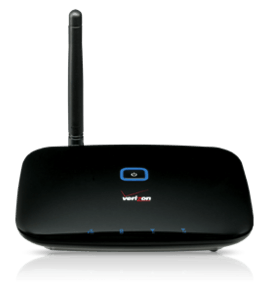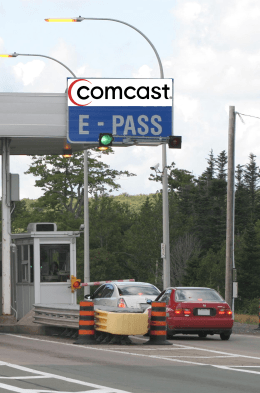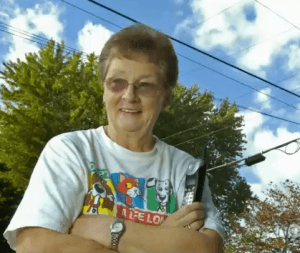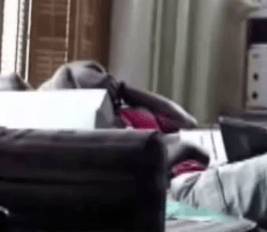
Verizon's Home Phone Connect base station
Verizon Communications has announced a new option for landline customers to ditch their local phone company with a new device that routes home phone calls over Verizon Wireless’ cellular network.
Verizon has chosen two test markets for its new Home Phone Connect service — Rochester, N.Y., serviced by Frontier Communications and Time Warner Cable and Connecticut, which is served by AT&T and Comcast. (Thanks to our reader Bob for sharing the news with us.)
The service works with your existing home wired and cordless phones. Customers signing up under a one or two year service contract will receive the base unit free of charge. Installation is as easy: Just unplug the phone cord from the wall and plug it into the back of the Home Phone Connect device. The unit supports up to two hard wired (non-cordless) phone lines and a cordless phone base station. When you pick up any phone around the house, the base station will deliver a familiar dial tone, but all calls are made and received over the Verizon Wireless cell phone network. You can download an read a copy of the installation manual here.
The service is priced at $9.99 per month for existing Verizon Wireless customers with any existing Family SharePlan that has two or more lines with at least a 700 minutes calling allowance per month. Customers using Home Phone Connect under this plan will use minutes from their existing wireless service plan. But since calls to and from Verizon customers and all calls placed during nights and weekends do not eat minutes, this may be a viable option for many customers.
For heavy talkers, or those without a qualifying Verizon Wireless service plan, an unlimited talk time plan is available for a flat $19.99 per month.
All local and domestic long distance calls are included, and the service also comes with these features:
- Call Waiting
- Call Forwarding
- Caller ID (not currently compatible with Caller ID + Name)
- International Dialing (charged at prevailing Verizon long distance rates)
- 3-Way Calling
- Basic Voice Mail (*86)
- Account Balance (*225)
- Device Provisioning, (*228)
- Account Payment (#786)
- 311, 411, 511, 611, 711 & 911 (some services not available in all areas)
- Last Number Callback (*69)
- National Domestic Hope Line (#4673)
The base unit includes a backup battery to power the unit for up to 36 hours idle time/2 hours talk time in the event of a power failure. Customers relying on landline service that works with a monitored alarm system should check with their alarm company to ensure compatibility with cell network technology.
 Michael Murphy, Verizon’s public relations manager for the New England Region, said consumers have the option of keeping their existing home phone number or requesting a new one. Customers who do switch their current home phone number to Verizon will automatically cancel their existing landline service. Frontier customers should carefully check their bills to make sure they are not on a Frontier “Peace of Mind” contract before switching. Any expiration dates adjacent to the type of home phone service described on your bill likely means you are on a term contract.
Michael Murphy, Verizon’s public relations manager for the New England Region, said consumers have the option of keeping their existing home phone number or requesting a new one. Customers who do switch their current home phone number to Verizon will automatically cancel their existing landline service. Frontier customers should carefully check their bills to make sure they are not on a Frontier “Peace of Mind” contract before switching. Any expiration dates adjacent to the type of home phone service described on your bill likely means you are on a term contract.
Customers dumping Frontier before their contract expires could be exposed to early termination fees of up to $300 or more, which will appear on a customer’s final bill. If you did not authorize a service contract, demand that Frontier drop it from your bill before you switch, and follow up with a complaint to the New York Attorney General’s office if the company fails to comply.
The device is intended to be portable, so you can take your “home phone” with you to any area served by a Verizon Wireless signal. Just pack the Home Phone Connect base station and take it along.
Verizon carefully chose test markets outside of Verizon landline service areas. That allows them to pick up new “landline” customers without harming their own landline business.
Verizon Wireless has a very large share of the Rochester, N.Y., market because of its ownership of the legacy Rochester Telephone cellular network. Verizon delivers far more robust coverage than any other regional cellular provider in western New York. With a built-in customer base wide open to Verizon’s marketing machine, the phone company could grab a significant number of Frontier landline customers who will see significant savings over Frontier’s comparable landline feature plans that run close to $50 a month after taxes and fees. The company could also poach a number of Time Warner Cable’s Digital Phone customers, especially those whose first year promotional discount has expired.
In Connecticut, Verizon is challenging AT&T, which provides most of the state with its landline service. Comcast is the dominant cable operator.
Comcast seemed unimpressed with the challenge being raised by Verizon in its service area. The cable company hinted Verizon’s lack of a bundled service option including phone, cable, and broadband would hurt its chances of success.
Indeed, Verizon will have to develop some creative marketing to make its Home Phone Connect stand out. Younger customers have no landlines to switch. Most of those eager to cut their home phone line have already moved to cellular or Voice Over IP services from their local cable company or other providers like Vonage. Existing Verizon Wireless customers may be hesitant about using a service that burns their wireless minutes away. Older customers are unlikely to understand the product and have a built-in resistance to dropping traditional phone service. Many may resist the notion of being stuck with at least a one year contract for an untested service.
T-Mobile attempted to market an almost identical service under its @Home brand, but judged it a failure and disconnected it earlier this year.
Because the service is being test marketed, its availability is limited to selected Verizon Wireless stores:

[flv width=”640″ height=”380″]http://www.phillipdampier.com/video/Verizon Home Phone Connect 11-23-10.mp4[/flv]
The New Haven Register set up a video interview with a Verizon representative to demonstrate its new Home Phone Connect service. (1 minute)



 Subscribe
Subscribe







